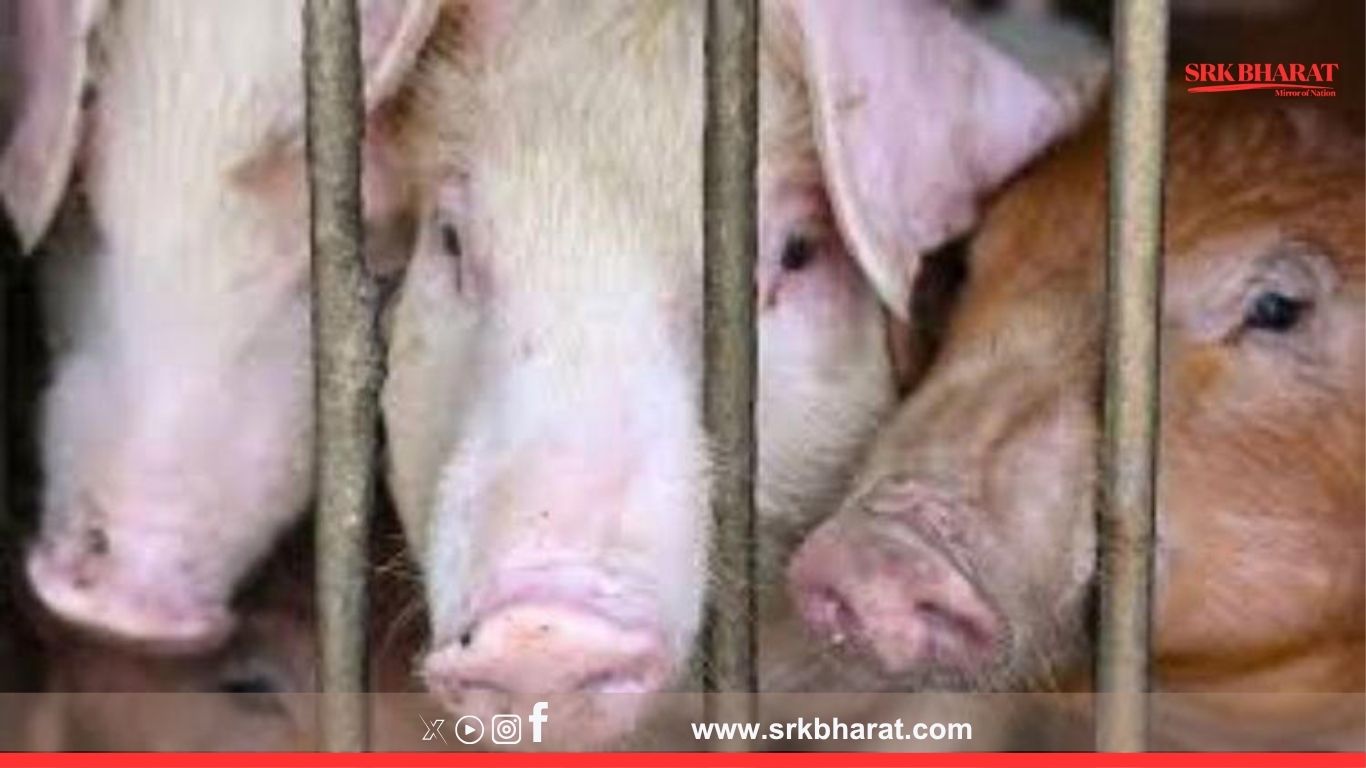The outbreak of African Swine Fever (ASF) has been confirmed in Arunachal Pradesh’s Longding district, prompting authorities to impose strict containment measures to prevent the deadly disease from spreading to neighbouring regions and threatening the state’s pig population, which forms a crucial part of tribal livelihood and local economy.
Official Confirmation and Immediate Measures
The Animal Husbandry and Veterinary Department confirmed the outbreak after samples sent to the North Eastern Regional Disease Diagnostic Laboratory (NERDDL) tested positive for ASF. Longding Deputy Commissioner Bani Lego issued an order declaring the affected villages as “infected zones” and surrounding areas as surveillance and containment zones”, as per the Prevention and Control of Infectious and Contagious Diseases in Animals Act, 2009.
Key measures being implemented include:
- Ban on movement of pigs and pork products from and to infected zones.
- Immediate culling of infected pigs to contain the virus spread.
- Disinfection of pig sheds, markets, and slaughter points.
- Deployment of rapid response veterinary teams for surveillance and containment.
Villages Under Containment Measures
According to district officials, the following villages have been declared infected zones:
| S.No | Village Name | Block | Action Taken |
|---|---|---|---|
| 1 | Longkai | Kanubari | Infected zone declared, pigs culled |
| 2 | Niausa | Kanubari | Surveillance intensified |
| 3 | Pumao | Longding | Movement restrictions enforced |
(Compiled from DC Longding office notification)
Understanding African Swine Fever
African Swine Fever is a highly contagious viral disease affecting domestic and wild pigs, with a mortality rate approaching 100% in severe outbreaks. Key aspects include:
- No cure or vaccine available; containment through culling remains the only effective control.
- Virus does not infect humans but causes devastating economic losses to pig farmers.
- Transmitted via direct contact with infected pigs, contaminated feed, or equipment.
Previous ASF Impact in Northeast India
Since its first detection in Assam and Arunachal Pradesh in 2020, ASF has:
- Killed over 50,000 pigs in Assam alone between 2020 and 2023.
- Caused losses worth hundreds of crores to pig-rearing tribal communities and small farmers in Arunachal, Mizoram, and Manipur.
- Led to strict import bans on pigs from affected areas by neighbouring states.
Economic Significance for Arunachal Pradesh
Pig farming is integral to the rural economy of Arunachal Pradesh:
- Nearly 80% of tribal households rear pigs, both for meat consumption and cultural ceremonies.
- Pig meat is a staple dietary protein source, with per capita consumption among the highest in India’s northeast.
- Outbreaks impact market supply, raise pork prices, and reduce household incomes significantly.
Containment and Support Strategy
State Veterinary Director Dr. K Deb advised pig farmers:
- To maintain strict biosecurity protocols, including use of disinfectants, controlled feeding, and restricting farm visitors.
- To report any sudden deaths immediately to veterinary officers for quick response.
District administration has assured:
- Compensation for culled pigs as per central government ASF outbreak guidelines.
- Enhanced supply of veterinary disinfectants and equipment to containment teams.
Public Health Advisory
Though ASF does not pose a direct threat to human health, health officials have urged:
- Avoiding consumption of pork from unknown or infected sources.
- Ensuring pork is cooked at high temperatures to eliminate any other pathogens.
Expert Views
Dr. Tana Tat, Veterinary Epidemiologist, noted:
“Without vaccination options, early detection, rapid culling, and movement restrictions remain the only tools to prevent ASF from wiping out pig populations in vulnerable states like Arunachal.”
Way Forward
The Arunachal Pradesh government is coordinating with:
- ICAR-National Research Centre on Pig (Assam) for technical support.
- North Eastern Council and Ministry of Animal Husbandry for funds to strengthen disease surveillance infrastructure in border districts.
Regional Coordination Needed
With Longding district sharing proximity to Nagaland and Assam, veterinary experts warn of cross-border spread risks. Officials are:
- Informing neighbouring state veterinary departments to step up border checks.
- Planning regional reviews to strengthen ASF containment strategies collectively.
Conclusion
The ASF outbreak in Longding is a stark reminder of the vulnerability of pig-rearing communities to zoonotic and animal diseases with no known cure. Strict containment, timely farmer compensation, and regional coordination will be critical to protect livelihoods and ensure meat security in Arunachal Pradesh and the northeast.
Disclaimer: This report is based on official notifications from Longding district administration and the Arunachal Pradesh Animal Husbandry Department. Readers are advised to follow updates from the local veterinary office for containment zone modifications and farmer compensation details.











